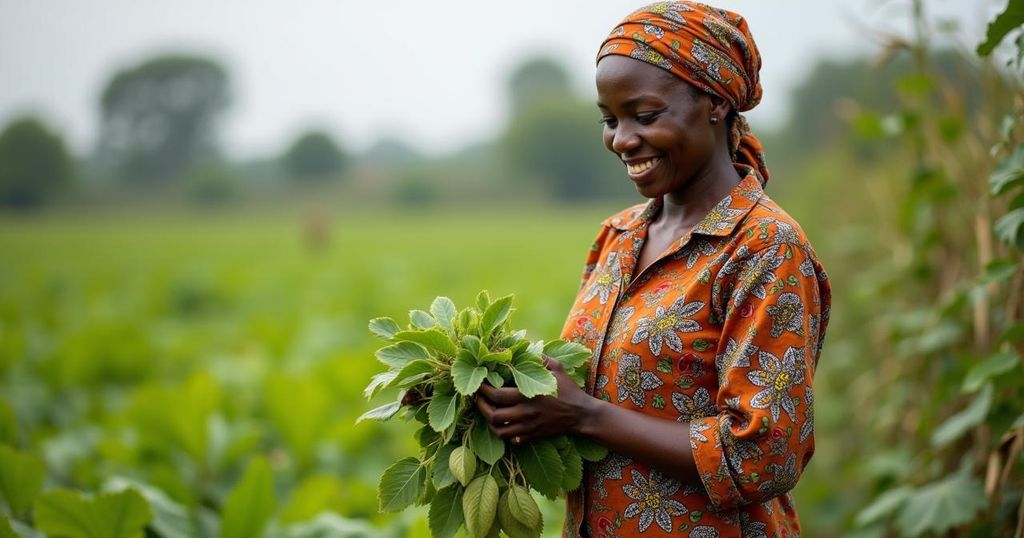Women farmers in Ghana, representing 70% of the agricultural workforce, are leading efforts against climate change through sustainable practices and advocacy for climate action. They emphasize the inclusion of agroecology in national strategies, highlighting the urgency of addressing climate-related challenges uniquely affecting women. Environmentalist Awula Serwah underscores the need for gender equality in leadership roles while calling for collaborative efforts to protect the environment.
In Ghana, women play an indispensable role in agriculture, comprising approximately 70% of the sector’s workforce. Primarily consisting of smallholder farmers, these women adopt ecological and organic methods, which significantly reduce reliance on synthetic chemicals, thereby contributing to environmental preservation. Despite facing constraints in resources, women farmers employ agroecological practices that enhance biodiversity, combat deforestation, sequester carbon, and mitigate greenhouse gas emissions. Their deep reliance on natural resources compels them to actively protect these vital elements from environmental degradation. United in a broader social movement, women farmers in Ghana are advocating passionately for transformative changes within the agricultural framework, urging the government to enact urgent and effective climate action. They contend that agroecology must be integrated as a fundamental aspect of the nation’s climate response strategies. Awula Serwah, a dedicated Ghanaian environmentalist and coordinator for Eco-Conscious Citizens Ghana, underscores the unique challenges climate change and environmental degradation pose, particularly for women and girls. She remarked, “Climate change and environmental degradation affect everyone. They are not respecter of persons. In communities where women and girls are responsible for food production, fetching water and fetching fuel for cooking, it is especially challenging for them.” Ms. Serwah insists that collective action is necessary, emphasizing that every individual must contribute towards alleviating the current environmental crisis. Regarding gender equality in the realm of climate adaptation, Ms. Serwah asserted that leadership should not be confined by gender limitations. “Anyone with a passion, an understanding of climate adaptation and the necessary skills and willingness to lead, should lead. It is crucial that we work towards gender equality but we shouldn’t make climate change a gender issue,” she noted. Drawing from the example of Prof. Wangari Maathai, the first African woman to receive a Nobel Peace Prize for her environmental activism, Ms. Serwah articulated that determination transcends gender. “A determined woman with a lot on her plate can lead on climate adaptation just as well as a man. We had Prof Maathai leading on the environmental matters long before people understood the importance of the environment and ended up being the first African woman to win a Nobel Peace Prize for her environmental work.” Her focus remains on the passion and commitment that drive individuals to effect change, rather than attributing success to gender. It is essential for governments and policymakers to devise inclusive strategies that empower and support women in climate change initiatives. Ms. Serwah stresses that women who aspire to lead in combating climate change should face no barriers but rather receive the necessary backing. “We all have a constitutional duty to protect the environment, and we should demand action,” she emphasized. The role of women farmers in Ghana is pivotal not only for the agricultural sector but also as champions in the fight against climate change. Their unique insights and experiences are invaluable assets in crafting sustainable practices and policies aimed at combating the climate crisis.
This article discusses the significant contributions of women farmers in Ghana as leaders in combating climate change. It highlights their critical role in agriculture, their adoption of sustainable practices, and their advocacy for climate action. The piece emphasizes the challenges faced by women in this context, the call for gender equality in leadership roles related to climate adaptation, and the importance of supporting these women to create impactful environmental policies.
In conclusion, women farmers in Ghana are at the forefront of mitigating climate change and promoting sustainable agricultural practices. Their collective advocacy for climate action and the inclusion of agroecology in policy development is vital for addressing environmental degradation. Recognizing their leadership and promoting gender equality in environmental initiatives are essential steps towards achieving effective climate solutions. The insights from leaders such as Awula Serwah illustrate the need for a unified effort to protect the environment and empower women in their advocacy roles.
Original Source: www.un.org







